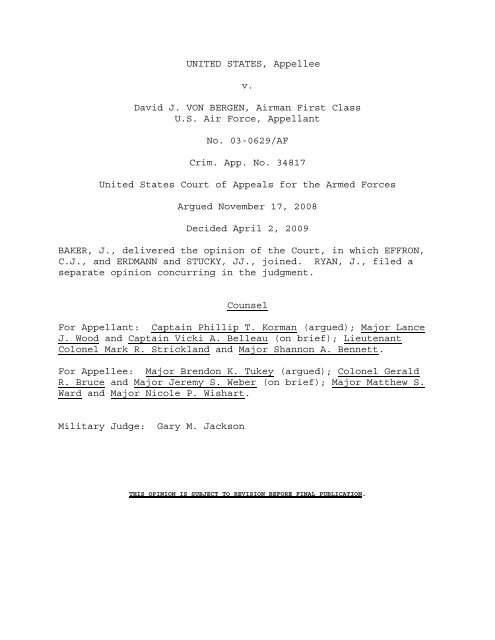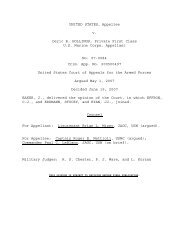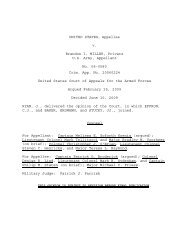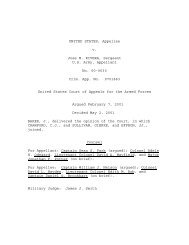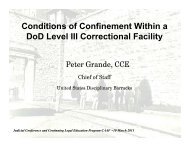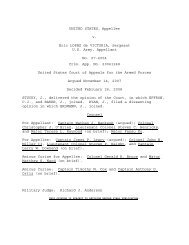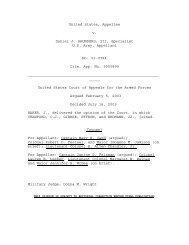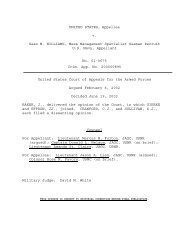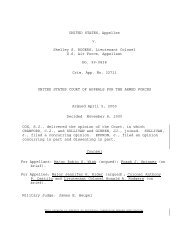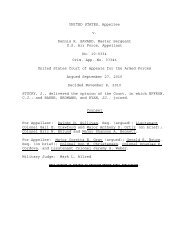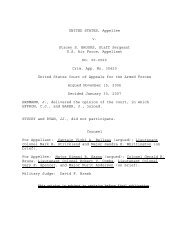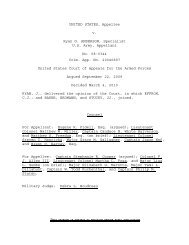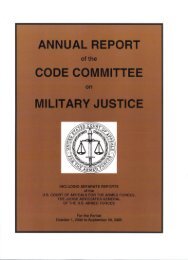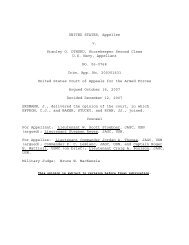United States v. Von Bergen - U.S. Court of Appeals for the Armed ...
United States v. Von Bergen - U.S. Court of Appeals for the Armed ...
United States v. Von Bergen - U.S. Court of Appeals for the Armed ...
You also want an ePaper? Increase the reach of your titles
YUMPU automatically turns print PDFs into web optimized ePapers that Google loves.
UNITED STATES, Appelleev.David J. VON BERGEN, Airman First ClassU.S. Air Force, AppellantNo. 03-0629/AFCrim. App. No. 34817<strong>United</strong> <strong>States</strong> <strong>Court</strong> <strong>of</strong> <strong>Appeals</strong> <strong>for</strong> <strong>the</strong> <strong>Armed</strong> ForcesArgued November 17, 2008Decided April 2, 2009BAKER, J., delivered <strong>the</strong> opinion <strong>of</strong> <strong>the</strong> <strong>Court</strong>, in which EFFRON,C.J., and ERDMANN and STUCKY, JJ., joined. RYAN, J., filed aseparate opinion concurring in <strong>the</strong> judgment.CounselFor Appellant: Captain Phillip T. Korman (argued); Major LanceJ. Wood and Captain Vicki A. Belleau (on brief); LieutenantColonel Mark R. Strickland and Major Shannon A. Bennett.For Appellee: Major Brendon K. Tukey (argued); Colonel GeraldR. Bruce and Major Jeremy S. Weber (on brief); Major Mat<strong>the</strong>w S.Ward and Major Nicole P. Wishart.Military Judge: Gary M. JacksonTHIS OPINION IS SUBJECT TO REVISION BEFORE FINAL PUBLICATION.
<strong>United</strong> <strong>States</strong> v. <strong>Von</strong> <strong>Bergen</strong>, No. 03-0629/AFJudge BAKER delivered <strong>the</strong> opinion <strong>of</strong> <strong>the</strong> <strong>Court</strong>.Appellant pleaded guilty in 2001 to violating a provision<strong>of</strong> <strong>the</strong> Child Pornography Prevention Act <strong>of</strong> 1996 (CPPA), codifiedat 18 U.S.C. § 2252A(a)(5)(A) (2000). Pursuant to his pretrialagreement, he waived his right to a hearing under Article 32,Uni<strong>for</strong>m Code <strong>of</strong> Military Justice (UCMJ), 10 U.S.C. § 832 (2000).However, this <strong>Court</strong> reversed his conviction on <strong>the</strong> basis <strong>of</strong><strong>United</strong> <strong>States</strong> v. Martinelli, 62 M.J. 52 (C.A.A.F. 2005). <strong>United</strong><strong>States</strong> v. <strong>Von</strong> <strong>Bergen</strong>, 62 M.J. 370 (C.A.A.F. 2005) (order). Onremand from this <strong>Court</strong>, Appellant received a rehearing in 2006on an amended specification <strong>of</strong> possessing child pornographycharged as a violation <strong>of</strong> clauses 1 and 2 <strong>of</strong> Article 134, UCMJ,10 U.S.C. § 934 (2000). Appellant pleaded not guilty, withdrewfrom his 2001 pretrial agreement, and moved <strong>for</strong> an Article 32,UCMJ, investigation on <strong>the</strong> ground that his previous Article 32,UCMJ, waiver was conditioned on <strong>the</strong> pretrial agreement fromwhich he had withdrawn. The military judge denied <strong>the</strong> motion on<strong>the</strong> grounds that Appellant’s earlier Article 32, UCMJ, waiverremained in effect and Appellant had not shown good cause <strong>for</strong>relief from his waiver. The <strong>United</strong> <strong>States</strong> Air Force <strong>Court</strong> <strong>of</strong>Criminal <strong>Appeals</strong> affirmed <strong>the</strong> findings and sentence. <strong>United</strong><strong>States</strong> v. <strong>Von</strong> <strong>Bergen</strong>, No. ACM 34817 (f rev), 2008 CCA LEXIS 17,at *13, 2008 WL 179271, at *5 (A.F. Ct. Crim. App. Jan. 9, 2008)(unpublished).2
<strong>United</strong> <strong>States</strong> v. <strong>Von</strong> <strong>Bergen</strong>, No. 03-0629/AFWe granted review <strong>of</strong> <strong>the</strong> following issue:WHETHER THE MILITARY JUDGE ERRED WHEN HE HELDAPPELLANT’S WAIVER OF HIS ARTICLE 32 RIGHTS FOR HIS 20SEPTEMBER 2001 COURT-MARTIAL APPLIED TO HIS 23 OCTOBER2006 REHEARING.We hold that <strong>the</strong> military judge erred in denying Appellant anArticle 32, UCMJ, investigation. Finding no material prejudiceto Appellant’s substantial rights, however, we affirm <strong>the</strong>findings and approve <strong>the</strong> sentence.BACKGROUNDAt his first court-martial, consistent with his pretrialagreement <strong>of</strong> September 10, 2001, and his pleas, Appellant wasconvicted <strong>of</strong> one specification <strong>of</strong> knowingly possessing acomputer disk containing images <strong>of</strong> child pornography inviolation <strong>of</strong> 18 U.S.C. § 2252A(a)(5)(A) and one specification <strong>of</strong>knowingly and wrongfully distributing child pornography ininterstate or <strong>for</strong>eign commerce by means <strong>of</strong> a computer inviolation <strong>of</strong> Article 134, UCMJ. 1Appellant’s pretrial agreementincluded an <strong>of</strong>fer to “waive a hearing under Article 32.” Italso included a withdrawal provision stating, among o<strong>the</strong>rthings, that:This agreement will also be canceled and <strong>of</strong> no effect,if any <strong>of</strong> <strong>the</strong> following occurs:1 According to <strong>the</strong> specifications, Appellant committed <strong>the</strong>charged acts “at or near Building 210, Royal Air Force BaseMildenhall, <strong>United</strong> Kingdom.”3
<strong>United</strong> <strong>States</strong> v. <strong>Von</strong> <strong>Bergen</strong>, No. 03-0629/AFa. Refusal <strong>of</strong> <strong>the</strong> court to accept my plea <strong>of</strong>guilty, as set <strong>for</strong>th above, or modification <strong>of</strong> <strong>the</strong>plea by anyone during <strong>the</strong> trial to not guilty or toa lesser degree <strong>of</strong> guilt.b. Withdrawal by ei<strong>the</strong>r party to <strong>the</strong> agreementbe<strong>for</strong>e <strong>the</strong> trial.The military judge engaged in <strong>the</strong> following colloquy withAppellant and his counsel regarding <strong>the</strong> waiver:MJ: Defense counsel, if <strong>the</strong> accused’s plea <strong>of</strong> guiltyis determined to be improvident will <strong>the</strong> accused beaf<strong>for</strong>ded an Article 32 investigation or is itpermanently waived?DC: It’s not permanently waived, ma’am.MJ: So it was contingent on <strong>the</strong> Offer <strong>for</strong> PretrialAgreement as well?DC: Yes, ma’am.MJ: And trial counsel, do you agree?ATC: Yes, ma’am.MJ: So you understand Airman <strong>Von</strong> <strong>Bergen</strong>, that, again,if <strong>for</strong> any reason I’m not able to accept your plea oryou’re not able to complete your Offer <strong>for</strong> PretrialAgreement and <strong>the</strong> convening authority’s not bound byit <strong>for</strong> some reason, that you would <strong>the</strong>n be af<strong>for</strong>dedyou [sic] right to an Article 32?ACC: Yes, ma’am.The military judge subsequently accepted Appellant’s guiltypleas and sentenced Appellant to a dishonorable discharge,confinement <strong>for</strong> twenty-eight months, and reduction to <strong>the</strong> grade<strong>of</strong> E-1. The convening authority approved <strong>the</strong> sentence asadjudged.4
<strong>United</strong> <strong>States</strong> v. <strong>Von</strong> <strong>Bergen</strong>, No. 03-0629/AFOn appeal, this <strong>Court</strong> affirmed <strong>the</strong> finding <strong>of</strong> guilty on <strong>the</strong>specification <strong>of</strong> distributing child pornography, but reversed<strong>the</strong> finding on <strong>the</strong> specification <strong>of</strong> possessing child pornographyand set aside <strong>the</strong> sentence. <strong>Von</strong> <strong>Bergen</strong>, 62 M.J. at 370. This<strong>Court</strong> returned <strong>the</strong> record <strong>of</strong> trial to <strong>the</strong> Judge Advocate General<strong>of</strong> <strong>the</strong> Air Force <strong>for</strong> fur<strong>the</strong>r action consistent with Martinelli,62 M.J. at 52. <strong>Von</strong> <strong>Bergen</strong>, 62 M.J. at 370. Accordingly, <strong>the</strong>convening authority authorized a rehearing and amended <strong>the</strong>specification related to possession <strong>of</strong> child pornography,eliminating reference to 18 U.S.C. § 2252A(a)(5)(A) andinserting language derived from clauses 1 and 2 <strong>of</strong> Article 134,UCMJ: “which conduct was prejudicial to good order anddiscipline in <strong>the</strong> armed <strong>for</strong>ces or <strong>of</strong> a nature to bring discreditupon <strong>the</strong> armed <strong>for</strong>ces.”At his rehearing in 2006, Appellant pleaded not guilty to<strong>the</strong> amended specification. Appellant withdrew from <strong>the</strong> pretrialagreement that he had entered at <strong>the</strong> original court–martial andmoved <strong>for</strong> an Article 32, UCMJ, investigation. Appellant arguedthat he was entitled to relief from his earlier Article 32,UCMJ, waiver because it was conditioned on <strong>the</strong> pretrialagreement from which he had since withdrawn. In response, <strong>the</strong>Government argued that no remedy was required because “<strong>the</strong>accused clearly waived his right to an Article 32 hearing” and5
<strong>United</strong> <strong>States</strong> v. <strong>Von</strong> <strong>Bergen</strong>, No. 03-0629/AF“<strong>the</strong> Defense has <strong>of</strong>fered no evidence <strong>of</strong> ‘good cause’ <strong>for</strong> relief<strong>of</strong> <strong>the</strong> accused’s waiver <strong>of</strong> an Article 32 hearing.”At <strong>the</strong> rehearing, <strong>the</strong> military judge denied <strong>the</strong> motion <strong>for</strong>relief, concluding that Appellant “had made a knowing andvoluntary waiver <strong>of</strong> his Article 32 hearing” and Appellant failedto show good cause <strong>for</strong> relief from <strong>the</strong> waiver. The militaryjudge found Appellant guilty under <strong>the</strong> amended specification andsentenced Appellant to a dishonorable discharge, confinement <strong>for</strong>three years, reduction to grade E-1, and <strong>for</strong>feiture <strong>of</strong> all payand allowances. Consistent with Rule <strong>for</strong> <strong>Court</strong>-Martial (R.C.M.)810(d)(1), <strong>the</strong> convening authority approved a sentence <strong>of</strong> adishonorable discharge, confinement <strong>for</strong> twenty-eight months, andreduction to grade E-1.The <strong>United</strong> <strong>States</strong> Air Force <strong>Court</strong> <strong>of</strong> Criminal <strong>Appeals</strong>affirmed <strong>the</strong> approved findings and sentence. <strong>Von</strong> <strong>Bergen</strong>, 2008CCA LEXIS 17, at *13, 2008 WL 179271, at *5. The <strong>Court</strong> <strong>of</strong>Criminal <strong>Appeals</strong> found that “[o]nce a pretrial investigation hasbeen waived, relief from that waiver can be obtained only <strong>for</strong>good cause shown.” Id. at *4, 2008 WL 179271, at *2 (quotationmarks omitted). The <strong>Court</strong> <strong>of</strong> Criminal <strong>Appeals</strong> rejectedAppellant’s argument that “under Nickerson, if <strong>the</strong> decision towaive <strong>the</strong> Article 32 investigation was in some way connected to<strong>the</strong> appellant’s decision to plead guilty, good cause to receiverelief from <strong>the</strong> waiver exists.” Id. at *5, 2008 WL 179271, at6
<strong>United</strong> <strong>States</strong> v. <strong>Von</strong> <strong>Bergen</strong>, No. 03-0629/AF*2 (citing <strong>United</strong> <strong>States</strong> v. Nickerson, 27 M.J. 30, 31-32 (C.M.A.1988)). As withdrawal from a pretrial agreement does not“automatically establish[] good cause” and “[A]ppellantpresented no o<strong>the</strong>r reason as a basis,” <strong>the</strong> <strong>Court</strong> <strong>of</strong> Criminal<strong>Appeals</strong> concluded that “he did not show good cause.” Id.Appellant also argued on appeal that good cause <strong>for</strong> reliefexisted under R.C.M. 405(k) because <strong>the</strong> Government destroyedcertain evidence be<strong>for</strong>e <strong>the</strong> rehearing and <strong>the</strong> specification waschanged. Id. at *5-*6, 2008 WL 179271, at *2. The <strong>Court</strong> <strong>of</strong>Criminal <strong>Appeals</strong> found that “[t]hese arguments were waived by<strong>the</strong> trial defense counsel’s failure to raise <strong>the</strong>m at trial, and<strong>the</strong> appellant is entitled to relief only if his case at trialwas harmed by this waiver.” Id. at *6, 2008 WL 179271, at *2.The <strong>Court</strong> <strong>of</strong> Criminal <strong>Appeals</strong> concluded that <strong>the</strong> destroyedevidence did not entitle Appellant to relief because“appellant’s confession, which was corroborated by eyewitnesstestimony, was more than sufficient to sustain a conviction attrial.” Id. at *6-*7, 2008 WL 179271, at *2. The <strong>Court</strong> <strong>of</strong>Criminal <strong>Appeals</strong> fur<strong>the</strong>r concluded that <strong>the</strong> amendment to <strong>the</strong>specification did not entitle Appellant to relief because“[c]hanging <strong>the</strong> allegation from an Article 134, UCMJ, Clause 3specification to one containing elements under Clauses 1 and 2does not amount to a significant change to <strong>the</strong> specification.”Id. at *7, 2008 WL 179271, at *3 (quotation marks omitted).7
<strong>United</strong> <strong>States</strong> v. <strong>Von</strong> <strong>Bergen</strong>, No. 03-0629/AFAdditionally, <strong>the</strong> <strong>Court</strong> <strong>of</strong> Criminal <strong>Appeals</strong> noted that, “ina sense, appellant has already received <strong>the</strong> benefit <strong>of</strong> his[pretrial agreement] from <strong>the</strong> first trial” because <strong>the</strong> conveningauthority fulfilled his obligation <strong>of</strong> approving a reducedsentence, and “<strong>the</strong> sentence <strong>of</strong> that trial <strong>for</strong>ms <strong>the</strong> basis <strong>of</strong> <strong>the</strong>maximum sentence that <strong>the</strong> convening authority can approve inthis trial.” Id. at *8, 2008 WL 179271, at *3. The <strong>Court</strong> <strong>of</strong>Criminal <strong>Appeals</strong> thus decided that “<strong>the</strong> military judge did noterr when he determined <strong>the</strong> appellant failed to establish goodcause, and <strong>the</strong> appellant was not harmed by trial defensecounsel’s failure to raise any <strong>of</strong> <strong>the</strong> matters <strong>the</strong> appellantraises on appeal.” Id.Appellant renews his arguments be<strong>for</strong>e this <strong>Court</strong>. Heargues that he was entitled to an Article 32, UCMJ,investigation because <strong>the</strong> 2006 specification was a “major”change from <strong>the</strong> 2001 specification. See R.C.M. 603. TheGovernment responds, inter alia, that <strong>the</strong> pretrial agreement wasconditioned on <strong>the</strong> military judge accepting Appellant’s 2001plea. The military judge having done so and <strong>the</strong> conveningauthority having fulfilled its sentencing commitment, <strong>the</strong>Government argues that <strong>the</strong> terms <strong>of</strong> <strong>the</strong> pretrial agreement weremet and Appellant remains bound on rehearing by his 2001 waiver.8
<strong>United</strong> <strong>States</strong> v. <strong>Von</strong> <strong>Bergen</strong>, No. 03-0629/AFDISCUSSIONThis <strong>Court</strong> reviews a military judge’s decision whe<strong>the</strong>r toorder relief from a waiver <strong>of</strong> an Article 32, UCMJ,investigation <strong>for</strong> an abuse <strong>of</strong> discretion. See <strong>United</strong> <strong>States</strong> v.Siroky, 44 M.J. 394, 398 n.1 (C.A.A.F. 1996) (“On discretionarydecisions, [<strong>the</strong> reviewing court] usually asks whe<strong>the</strong>r <strong>the</strong>decision is legal in <strong>the</strong> sense <strong>of</strong> being within <strong>the</strong> prescribedboundaries which define <strong>the</strong> area <strong>of</strong> discretion.”) (quotingMartha S. Davis, A Basic Guide to Standards <strong>of</strong> Judicial Review,33 S.D. L. Rev. 468, 472-73 (1988) (footnote omitted)). “Wereview a military judge’s conclusions <strong>of</strong> law under <strong>the</strong> de novostandard. If a military judge’s ruling is based on anerroneous view <strong>of</strong> <strong>the</strong> law, he has abused his discretion.”<strong>United</strong> <strong>States</strong> v. Mobley, 44 M.J. 453, 454 (C.A.A.F. 1996)(quotation marks omitted). Based on <strong>the</strong> following analysis, weconclude that <strong>the</strong> military judge abused his discretion indenying Appellant an Article 32, UCMJ, investigation onrehearing. Two related arguments are persuasive. First and<strong>for</strong>emost, Appellant’s 2001 plea was improvident as a matter <strong>of</strong>law, which had <strong>the</strong> effect <strong>of</strong> canceling <strong>the</strong> pretrial agreementaccording to its terms. Alternatively, whe<strong>the</strong>r <strong>the</strong> 2006Article 134(1) and (2), UCMJ, specification represented a majorchange to <strong>the</strong> 2001 Article 134(3), UCMJ, specification or not,<strong>the</strong> effect <strong>of</strong> <strong>the</strong> rehearing and Appellant’s subsequent9
<strong>United</strong> <strong>States</strong> v. <strong>Von</strong> <strong>Bergen</strong>, No. 03-0629/AFwithdrawal from <strong>the</strong> agreement was to place <strong>the</strong> parties in <strong>the</strong>irpretrial status quo ante. See R.C.M. 705(d)(4).As noted above, when this case came be<strong>for</strong>e this <strong>Court</strong> <strong>the</strong>first time, we reversed <strong>the</strong> finding on <strong>the</strong> specification <strong>of</strong>possessing child pornography based on Martinelli. <strong>Von</strong> <strong>Bergen</strong>,62 M.J. at 370; see Martinelli, 62 M.J. at 62 (concluding that<strong>the</strong> CPPA does not apply extraterritorially, thus <strong>the</strong> CPPA asincorporated into Article 134(3), UCMJ, does not applyextraterritorially). As in Martinelli itself, Appellant’s pleawas improvident with respect to <strong>the</strong> Article 134(3), UCMJ,specification. Fur<strong>the</strong>r, and also as in Martinelli, <strong>the</strong>specification did not reference prejudice to good order anddiscipline or service discredit, and <strong>the</strong> military judge during<strong>the</strong> providence inquiry did not sufficiently inquire into whe<strong>the</strong>rAppellant was willing to admit that his conduct was prejudicialto good order and discipline or service discrediting.Martinelli, 62 M.J. at 670. Thus, we cannot uphold an <strong>of</strong>fenseunder Article 134(1) or (2), UCMJ, which, as explained in <strong>United</strong><strong>States</strong> v. Medina, 66 M.J. 21, 26 (C.A.A.F. 2008), do notnecessarily constitute lesser included <strong>of</strong>fenses <strong>of</strong> Article134(3), UCMJ. As a result, Appellant’s plea was improvident.Although improvidence <strong>of</strong> <strong>the</strong> plea upon appellate review wasnot an express basis <strong>for</strong> cancellation in <strong>the</strong> pretrial agreement,this <strong>Court</strong>’s decision had <strong>the</strong> same effect as if <strong>the</strong> military10
<strong>United</strong> <strong>States</strong> v. <strong>Von</strong> <strong>Bergen</strong>, No. 03-0629/AFjudge had not accepted Appellant’s plea, which was an expressbasis <strong>for</strong> cancellation. As a matter <strong>of</strong> law, <strong>the</strong> plea could nothave been accepted by <strong>the</strong> military judge. As <strong>the</strong> military judgecould not have accepted an improvident plea, <strong>the</strong> pretrialagreement was subject to <strong>the</strong> first cancellation term.Thus, a condition precedent to <strong>the</strong> Article 32, UCMJ,waiver, acceptance <strong>of</strong> <strong>the</strong> pleas, never occurred. There<strong>for</strong>e, <strong>the</strong>waiver was not in effect at <strong>the</strong> rehearing. This point isrein<strong>for</strong>ced by <strong>the</strong> military judge’s explanation to Appellant at<strong>the</strong> 2001 court-martial that Appellant would be af<strong>for</strong>ded anArticle 32, UCMJ, investigation should <strong>the</strong> military judge notaccept Appellant’s pleas <strong>for</strong> any reason. Moreover, during <strong>the</strong>same colloquy, <strong>the</strong> parties agreed that <strong>the</strong> Article 32, UCMJ,waiver would not apply if Appellant’s pleas were “determined tobe improvident.”Even if <strong>the</strong> pretrial agreement were still in effect -- andwe are convinced that it was not -- when this <strong>Court</strong> set asideAppellant’s plea and <strong>the</strong> amended specification was referred <strong>for</strong>rehearing, Appellant’s subsequent withdrawal from <strong>the</strong> agreementmeant that <strong>the</strong> court-martial process should have begun anew.R.C.M. 810(a)(1) provides that: “[rehearing] procedure shall be<strong>the</strong> same as in an original trial.” There<strong>for</strong>e, “<strong>the</strong> effect <strong>of</strong>ordering a rehearing is . . . to place <strong>the</strong> <strong>United</strong> <strong>States</strong> and <strong>the</strong>accused in <strong>the</strong> same position as <strong>the</strong>y were at <strong>the</strong> beginning <strong>of</strong>11
<strong>United</strong> <strong>States</strong> v. <strong>Von</strong> <strong>Bergen</strong>, No. 03-0629/AF<strong>the</strong> original trial.” <strong>United</strong> <strong>States</strong> v. Staten, 21 C.M.A. 493,495, 45 C.M.R. 267, 269 (1972). As one <strong>of</strong> <strong>the</strong> first steps in ageneral court-martial proceeding is an Article 32, UCMJ,investigation, unless <strong>the</strong> accused waives it, one <strong>of</strong> <strong>the</strong> firststeps at <strong>the</strong> rehearing in this general court-martial proceedingshould likewise have been an Article 32, UCMJ, investigation ifnot previously af<strong>for</strong>ded to <strong>the</strong> accused. See Article 32, UCMJ;see generally <strong>United</strong> <strong>States</strong> v. Beatty, 25 M.J. 311, 315 (C.M.A.1987) (asserting that “<strong>the</strong>re is no necessity <strong>for</strong> conducting anew Article 32, UCMJ, 10 U.S.C. § 832, investigation”) (emphasisadded). Accordingly, when this <strong>Court</strong> reversed and remanded thiscase, Appellant should have been af<strong>for</strong>ded an Article 32, UCMJ,investigation prior to <strong>the</strong> rehearing, unless Appellant waived itat that time.As a result, <strong>the</strong> military judge erred by relying on anArticle 32, UCMJ, waiver that was no longer effective at <strong>the</strong>rehearing. Because Appellant did not knowingly and voluntarilywaive his Article 32, UCMJ, rights at <strong>the</strong> rehearing, we do notneed to inquire fur<strong>the</strong>r into whe<strong>the</strong>r Appellant has shown goodcause <strong>for</strong> relief. See R.C.M. 405(k). It is enough thatAppellant’s Article 32, UCMJ, waiver was conditioned on apretrial agreement that was not in effect at <strong>the</strong> rehearing, or,in <strong>the</strong> alternative, that referring <strong>the</strong> amended specification <strong>for</strong>12
<strong>United</strong> <strong>States</strong> v. <strong>Von</strong> <strong>Bergen</strong>, No. 03-0629/AFrehearing started <strong>the</strong> court-martial process anew. However, ouranalysis does not stop with a finding <strong>of</strong> error.PrejudiceArticle 32, UCMJ, errors are tested on direct review <strong>for</strong>prejudice as defined by Article 59(a), UCMJ, 10 U.S.C. § 859(a)(2000). <strong>United</strong> <strong>States</strong> v. Davis, 64 M.J. 445, 449 (C.A.A.F.2007); see also <strong>United</strong> <strong>States</strong> v. Mickel, 9 C.M.A. 324, 327, 26C.M.R. 104, 107 (1958) (“Once <strong>the</strong> case comes to trial on <strong>the</strong>merits, <strong>the</strong> pretrial proceedings are superseded by <strong>the</strong>procedures at <strong>the</strong> trial; <strong>the</strong> rights accorded to <strong>the</strong> accused in<strong>the</strong> pretrial stage merge into his rights at trial.”).Appellant argues that he was prejudiced by <strong>the</strong> absence <strong>of</strong>an Article 32, UCMJ, hearing due to <strong>the</strong> passage <strong>of</strong> time betweenhis first and second courts-martial, during which time witnessmemories may have faded and original documentary evidence wasdestroyed. Appellant also argues that an Article 32, UCMJ,investigation would have af<strong>for</strong>ded him <strong>the</strong> opportunity to preparehis defense to <strong>the</strong> changed specification and test <strong>the</strong> strength<strong>of</strong> <strong>the</strong> Government’s case based on <strong>the</strong> evidence available at <strong>the</strong>rehearing.We disagree.First, while <strong>the</strong> specification was indeed amended to change<strong>the</strong> underlying <strong>of</strong>fense from a violation <strong>of</strong> <strong>the</strong> CPPA to aviolation <strong>of</strong> Article 134(1) and (2), UCMJ, Appellant was on fair13
<strong>United</strong> <strong>States</strong> v. <strong>Von</strong> <strong>Bergen</strong>, No. 03-0629/AFnotice regarding how <strong>the</strong> specification would be amended afterremand from this <strong>Court</strong> based on this <strong>Court</strong>’s precedents inMartinelli and o<strong>the</strong>r cases that have addressed <strong>the</strong> CPPA. See,e.g., <strong>United</strong> <strong>States</strong> v. O’Connor, 58 M.J. 450, 454-55 (C.A.A.F.2003); <strong>United</strong> <strong>States</strong> v. Mason, 60 M.J. 15, 18, 20 (C.A.A.F.2004). Second, <strong>the</strong> new specification addressed <strong>the</strong> same conductas <strong>the</strong> original specification. Third, <strong>the</strong> Government relied onmuch <strong>of</strong> <strong>the</strong> same evidence as at Appellant’s original courtmartial,such as Appellant’s statement and testimony <strong>of</strong>witnesses who had statements or stipulations <strong>of</strong> expectedtestimony admitted as evidence at <strong>the</strong> 2001 court-martial.Finally, <strong>the</strong> witnesses testified about <strong>the</strong> destroyed evidence,including what <strong>the</strong> images portrayed, how <strong>the</strong>y were found, andhow <strong>the</strong>y were traced to Appellant. In a different context, <strong>the</strong>destruction <strong>of</strong> <strong>the</strong> original evidence and passage <strong>of</strong> time mightwell be prejudicial; however, under <strong>the</strong>se circumstances,Appellant was not prejudiced by <strong>the</strong> military judge’s error innot ordering an Article 32, UCMJ, investigation.DECISIONAccordingly, subject to <strong>the</strong> <strong>for</strong>egoing discussion, <strong>the</strong>decision <strong>of</strong> <strong>the</strong> <strong>United</strong> <strong>States</strong> Air Force <strong>Court</strong> <strong>of</strong> Criminal<strong>Appeals</strong> is affirmed.14
<strong>United</strong> <strong>States</strong> v. <strong>Von</strong> <strong>Bergen</strong>, No. 03-0629/AFRYAN, J. (concurring in <strong>the</strong> judgment):I concur in <strong>the</strong> judgment because I agree with <strong>the</strong>majority’s conclusion that <strong>the</strong> pretrial agreement (PTA) in thiscase did not waive Appellant’s right to a pretrialinvestigation, pursuant to Article 32, Uni<strong>for</strong>m Code <strong>of</strong> MilitaryJustice (UCMJ), 10 U.S.C. § 832 (2000), on <strong>the</strong> amended andrereferred charge. I also agree that while Appellant wasentitled to an Article 32, UCMJ, investigation on <strong>the</strong> amendedcharge, he was not prejudiced by <strong>the</strong> lack <strong>of</strong> such aninvestigation. <strong>United</strong> <strong>States</strong> v. <strong>Von</strong> <strong>Bergen</strong>, __ M.J. __ (13-14)(C.A.A.F. 2009).The granted issue can be resolved on a simple basis:Whe<strong>the</strong>r or not Appellant’s original waiver via <strong>the</strong> PTA in thiscase was canceled by our order <strong>of</strong> <strong>the</strong> rehearing, <strong>Von</strong> <strong>Bergen</strong>, __M.J. at __ (10-11), and whe<strong>the</strong>r or not <strong>the</strong> rehearing itselfpermitted Appellant to withdraw from <strong>the</strong> PTA, 1 id. at __ (11),1 Although <strong>the</strong> majority opinion finds that <strong>the</strong> PTA was not ineffect at <strong>the</strong> rehearing, a portion <strong>of</strong> <strong>the</strong> opinion assumes,arguendo, that <strong>the</strong> PTA did remain in effect. <strong>Von</strong> <strong>Bergen</strong>, __M.J. at __ (9, 11-12). Even so, <strong>the</strong> majority holds thatAppellant subsequently withdrew from <strong>the</strong> PTA and was <strong>the</strong>re<strong>for</strong>eentitled to an Article 32, UCMJ, investigation. Despite <strong>the</strong>Government’s argument that Appellant’s right to withdraw from<strong>the</strong> PTA no longer existed, <strong>the</strong> majority posits, withoutexplanation, a connection between <strong>the</strong> order <strong>of</strong> rehearing andAppellant’s right to withdraw. Brief <strong>of</strong> Appellee at 7, <strong>United</strong><strong>States</strong> v. <strong>Von</strong> <strong>Bergen</strong>, No. 03-0629 (C.A.A.F. Sept. 5, 2008). Wehave previously stated that <strong>the</strong> effect <strong>of</strong> a rehearing isgenerally to “place <strong>the</strong> <strong>United</strong> <strong>States</strong> and <strong>the</strong> accused in <strong>the</strong>
<strong>United</strong> <strong>States</strong> v. <strong>Von</strong> <strong>Bergen</strong>, No. 03-0629/AFit is certain that <strong>the</strong> agreement between Appellant and <strong>the</strong>Government to waive Appellant’s right to an Article 32, UCMJ,investigation referred only to <strong>the</strong> original charges andspecifications, and not to <strong>the</strong> new charge and specificationreferred at <strong>the</strong> rehearing. Offer <strong>for</strong> Pretrial Agreement, at 1,<strong>United</strong> <strong>States</strong> v. <strong>Von</strong> <strong>Bergen</strong>, No. FR358-76-6491 (USAF TrialJudiciary Sept. 10, 2001) (“I have read <strong>the</strong> charges andspecifications alleged against me and <strong>the</strong>y have been explainedto me . . . . Understanding <strong>the</strong> above and under <strong>the</strong> conditionsset <strong>for</strong>th below, . . . I <strong>of</strong>fer . . . to waive a hearing underArticle 32, UCMJ.”).The specification at issue in this appeal was originallycharged and pleaded to as a violation <strong>of</strong> clause 3 <strong>of</strong> Article134, UCMJ. A rehearing was ordered because that specificationsame position as <strong>the</strong>y were at <strong>the</strong> beginning <strong>of</strong> <strong>the</strong> originaltrial.” <strong>United</strong> <strong>States</strong> v. Staten, 21 C.M.A. 493, 495, 45 C.M.R.267, 269 (1972). But we have also acknowledged that rehearings“have long been treated as a continuation <strong>of</strong> <strong>the</strong> first trial.”Id. Rehearings are ordered <strong>for</strong> many different reasons, and ourprior treatment <strong>of</strong> this issue suggests that some agreements madebe<strong>for</strong>e or during <strong>the</strong> original trial may continue in effectduring a subsequent rehearing, while o<strong>the</strong>rs may not. Id.(“There are exceptions to <strong>the</strong> rule” that a “rehearing <strong>of</strong> <strong>the</strong>case generally leaves <strong>the</strong> proceedings in <strong>the</strong> same position asbe<strong>for</strong>e trial.”) (quoting <strong>United</strong> <strong>States</strong> v. Cox, 12 C.M.A. 168,169, 30 C.M.R. 168, 169 (1961)) (quotation marks omitted). Theissue granted did not cover this tension and <strong>the</strong> parties’briefing did not seek to resolve it; I do not fault <strong>the</strong> majority<strong>for</strong> declining to address <strong>the</strong> tension between <strong>the</strong>se cases. Butit seems an imprudent path to proceed to decide <strong>the</strong> case, albeiton an alternate ground, as if <strong>the</strong> tension does not exist.2
<strong>United</strong> <strong>States</strong> v. <strong>Von</strong> <strong>Bergen</strong>, No. 03-0629/AF<strong>of</strong> <strong>the</strong> charge relied on extraterritorial application <strong>of</strong> <strong>the</strong>Child Pornography Prevention Act <strong>of</strong> 1996 (CPPA), 18 U.S.C. §2252A (2000). <strong>United</strong> <strong>States</strong> v. <strong>Von</strong> <strong>Bergen</strong>, 62 M.J. 370(C.A.A.F. 2005) (summary disposition); <strong>United</strong> <strong>States</strong> v.Martinelli, 62 M.J. 52, 62 (C.A.A.F. 2005) (holding that <strong>the</strong>CPPA does not have exterritorial application). On rehearing,<strong>the</strong> convening authority amended <strong>the</strong> original specification fromalleging a violation <strong>of</strong> clause 3 <strong>of</strong> Article 134, UCMJ, toalleging a violation <strong>of</strong> clauses 1 or 2 <strong>of</strong> Article 134, UCMJ, andreferred this new specification to a general court-martial.Absent specific pleadings and pro<strong>of</strong>, clauses 1 and 2 <strong>of</strong>Article 134, UCMJ, are not lesser included <strong>of</strong>fenses <strong>of</strong> clause 3,Article 134, UCMJ. See, e.g., <strong>United</strong> <strong>States</strong> v. Medina, 66 M.J.21, 26 (C.A.A.F. 2008) (holding that clauses 1 and 2 are notnecessarily lesser included <strong>of</strong>fenses <strong>of</strong> clause 3). Appellant’swaiver <strong>of</strong> an Article 32, UCMJ, pretrial investigation pursuantto <strong>the</strong> PTA could not constitute a waiver <strong>for</strong> an <strong>of</strong>fense <strong>the</strong> PTAdid not address. Appellant was entitled to a new Article 32,UCMJ, pretrial investigation prior to referral <strong>of</strong> <strong>the</strong> newspecification to trial by general court-martial, and it waserror <strong>for</strong> <strong>the</strong> military judge to deny his request. See R.C.M.405(a) (“[N]o charge or specification may be referred to ageneral court-martial <strong>for</strong> trial until a thorough and impartialinvestigation . . . has been made . . . .”).3
<strong>United</strong> <strong>States</strong> v. <strong>Von</strong> <strong>Bergen</strong>, No. 03-0629/AFI also take exception to <strong>the</strong> majority’s statement that ourprior remand <strong>of</strong> this case was partially due to <strong>the</strong> fact that <strong>the</strong>original providence inquiry did not reveal sufficient evidenceto affirm a conviction under clauses 1 or 2 <strong>of</strong> Article 134,UCMJ. <strong>Von</strong> <strong>Bergen</strong>, __ M.J. at __ (9-10). I continue to doubtthat affirming a conviction to a failed charge and specification<strong>of</strong> clause 3, Article 134, UCMJ, under clauses 1 or 2 <strong>of</strong> Article134, UCMJ, as a lesser included <strong>of</strong>fense based on <strong>the</strong> contents <strong>of</strong><strong>the</strong> providency inquiry alone passes constitutional muster. SeeSchmuck v. <strong>United</strong> <strong>States</strong>, 489 U.S. 705, 718 (1989) (allowinglesser included <strong>of</strong>fense instructions “only in those cases where<strong>the</strong> indictment contains <strong>the</strong> elements <strong>of</strong> both <strong>of</strong>fenses and<strong>the</strong>reby gives notice to <strong>the</strong> defendant that he may be convictedon ei<strong>the</strong>r charge”); Medina, 66 M.J. at 26 (emphasizing anaccused’s “right to know to what <strong>of</strong>fense and under what legal<strong>the</strong>ory he or she is pleading guilty”); Jones v. <strong>United</strong> <strong>States</strong>,526 U.S. 227, 232 (1999) (“Much turns on <strong>the</strong> determination thata fact is an element <strong>of</strong> an <strong>of</strong>fense . . . given that elementsmust be charged in <strong>the</strong> indictment, submitted to a jury, andproven by <strong>the</strong> Government beyond a reasonable doubt.”).I concur in <strong>the</strong> judgment.4


